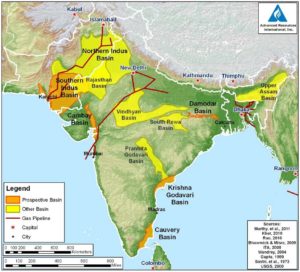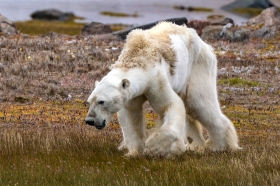by OilPrice.com, August 4, 2018 in GWPF
India’s cabinet approved on Wednesday a policy to allow companies to explore and exploit unconventional oil and gas resources such as shale oil and gas and coalbed methane under the existing production sharing contracts, as it aims to reduce its dependency on energy imports.
…

by Tribune de Genève, 5 août 2018 in LesBlogs
Also FoxNews: Photographer behind viral image of starving polar bear raises questions about climate change narrative
Il y a juste un an, l’image d’un ours décharné et titubant avait fait le tour du monde. Elle était supposée représenter la réalité du réchauffement de l’atmosphère. Pourtant cette hypothèse n’était pas plus probable qu’une autre, par exemple: ours vieux, malade, mourant de mort naturelle.
…

by P. Gosselin, August 3, 2018 in NoTricksZone
Despite all the hysterical “heat wave” and drought reports being put out to the public by the media, the Northern Hemisphere as a whole is in fact not at all that much warmer than the mean since 2000.
According to Dr. Ryan Maue, northern hemisphere temperature anomaly was zero on July 30 and the northern hemisphere land surface anomaly was actually -0.20°C.
…
by C3Headlines, February 1, 2016
The below is a list of past severe weather events and natural disasters – prior to the consistent 350+ppm CO2 levels attained in the 1990’s. In addition, scattered throughout the list are interesting “expert” climate predictions and observations
…
See alos here
by Anthony Watts, August 4, 2018 in WUWT
UM Rosenstiel School-led study exposes two threatened corals to future climate change conditions
MIAMI—New research shows that not all corals respond the same to changes in climate. The University of Miami (UM) Rosenstiel School of Marine and Atmospheric Science-led study looked at the sensitivity of two types of corals found in Florida and the Caribbean and found that one of them—mountainous star coral—possesses an adaptation that allows it to survive under high temperatures and acidity conditions.
“Stressful periods of high temperature and increasingly acidic conditions are becoming more frequent and longer lasting in Florida waters,” said Chris Langdon, marine biology and ecology professor and lead author on the new study. “However, we found that not all coral species are equally sensitive to climate change and there’s hope that some species that seemed doomed may yet develop adaptations that will allow them to survive as well.”
…
See also (in French) here and here
La géologie, une science plus que passionnante … et diverse


